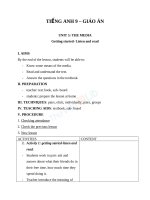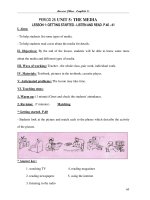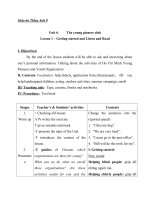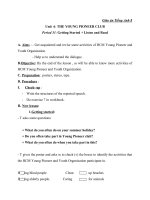Giáo án Tiếng Anh 9 unit 6: The environment
Bạn đang xem bản rút gọn của tài liệu. Xem và tải ngay bản đầy đủ của tài liệu tại đây (116.2 KB, 15 trang )
GIÁO ÁN TIẾNG ANH LỚP 9.
Period:37
Unit6: the enviroment
Lesson 1: Getting started + Listen and read
I/The aims of the lesson
-To help ss read the work of a group of coservationists,getting started the topic of
the unit 6 and get to know some structures.
*Vocabulary: deforestation, garbage dump,dynamite fishing,spraying
pesticides,disappointed,sewage.
*Grammar: Conditional sentence(type 1),Be adj + that clause.
*Skills:- Main
skill: Reading
-Other skills: Listening, speaking, writing.
II/The objective of the lesson.
By the end of the lesson, students will know more about the enviroment problems
and the solutions,understand the structures & practice well.
III/Teaching aids
Radio,tape record,textbook,pictures.
IV/Procedures
1.Warm up
Getting started:
T: run through pictues in the book.
Do you know what is it?(If no,T elicit to give the answer for the pictures.)
*SS match the environmental problems to the pictures.
-Ask students to look at the six pictures on page 47 in their text books.
- Ask them to match the words in the box with the correct pictures.
- T: Get feed back.
*Answer key:
1-c
3-a
5-d
2-e
4-f
6-b.
2.Pre teach vocabulary
- deforestation( n) : sự tàn phá rừng
(explanation)
- garbage dump (n) : đống rác
(picture)
- dynamite fishing (n): việc đánh bắt cá bằng thuốc nổ
(picture)
- spraying pesticides (n) việc phun thuốc diệt sâu bọ
(picture)
- disappointed ( by/ about/ at something ) ( adj): thất vọng , buồn rầu (SYN)
- sewage ( n) nước thải , nước cống
(traslation)
* Check: What and where
3.Presentation
T :-To day we are going to read the text about about the work of a group of
covervationists.
* Matching
* Prediction:
- Ask students to keep the books closed.
* Set the scene: Mr. Brown is talking to some volunteer conservationists. Guess the
place where they are going to work.
- Give students 1 minute to guess.
- Give feedback.
- T: -Asks students to read the text and check their guesses.
- Ask student to open their books and read the text on page 47-48.
- Let students check their prediction.
* Answer keys:
- The conservationists are going to clean the beach.
I. Matching:
- Ask students to match the names in column a with the activities in column
B (exercise 2a on page 48).
- Ask them to raed the text again and work in pairs to match.
* Answer keys:
Group 1 – f. walk along the shore.
Group 2 – e. check the sand.
Group 3 – b. check among the rock.
Mr. Jones – a. collect all the bags and take them to the garbage dump.
Mrs. Smith – c. provide the picnic lunch for everyone.
Mr. Brown – d. give out the bags.
*. Comprehension questions
- Ask student to work in pairs to answer the questions on page 48 (exercice
2b).
- Let students raed the text again and answer the question.
- Give feedback.
Ask some questions about the text.
*Conditional sentence(type 1)
If we work hard,we’ll make this beach a clean and beautiful place.
-Form: If + S + V + .....,S + WILL + Bare infi-.....
-Use: To express an action may happen in the future.
-Meaning: Translate again.
-Pronunciation: Read again.
4.Practice
Work in pairs after running through,one make if-cl and other makes main cl.
-Make conditional sentences:
a.If the rice paddies/polluted,the rice plants/die.
b.if we/use/much pesticides on vegetables,the vegetables/become/poisonous.
c.If we/ keep/our environment clean,we/live/happier and healthier life.
d.If we/go on littering,environment/become/seriously polluted.
5.Production
*Do matching in L.F 4.
*Ss write sentences about the reasons of the pollution.
Ss work in groups of 5 in 5’.
Get feed back & correct.
6.Homework assignment
-Do ex 1 in the work book.
-Learn by heart vocabulary.
-Answer the qs into the notebook.
Period:38
Unit 6: the environment
Lesson 2: Speak and Listen
I/The aims of the lesson:
-To help ss pratice speaking to persuade people to protect the environment;listen to
the report on how our oceans are polluted.
*Skills:-Main skill: Listening Speaking
-Other skills: Writing, Reading.
II/The objective of the lesson
By the end of the lesson, students will be able to persuade friends to protect the
environment,complete the note.
III/Teaching aids
Text book,poster,record tape,stereo
IV/Procedure
1.Check up
-Write new words.
-Read the dialogue & answer the qs.
2.Warm up
* Jumpled words
1. uaderpse = persuade
2. beaargg = garbage
3. roderpvi = provide
4. lupotilon = pollution
5. duproce = produce
6. paispoidednt = disappointed
3.Preteach vocabulary
_To prevent : ngăn chặn , phòng chống
-To reduce : làm giảm
( definition)
( example)
-To wrap(v):
bao bọc
( mime)
-a faucet(n) : vòi nước
( realia)
-A leaf – leaves : lá
( realia)
-To reuse:tai su dung
(Explain)
-To recycle: Tai che
(Explain)
* Check: ROR some
4.Pre speaking
-Today we will learn how to use the structure : What/ how about + Ving.
* Matching
- T: Asks Ss to complete the expressions in column A by using one of the lines in
column B ( page 49)
- Ss: Do and then share compare with their partners.
* Form :
I think you should
Won’t you
It would be better if you
+ INFINITIVE
Can I persuade you to
Why don’t you
Why not
What / how about
+ Ving
* Use : Express persuading
5.While speaking
- Each Ss calls out one of their sentences until all sentences are finished.
Example: S1 : I think you should use banana leaves to wrap food.
T: Asks Ss to work inpair to answer the question in the questionnaire
Ss : Work in pairs to answer the questionaire.
• Questions.
1. How can we save paper ?
2. How can we use fewer plastic bags?
3. How can we reduce water pollution?
4. How can we prevent littering?
5. How can we reduce air pollution?
6. How can we reduce the amount of garbage we produce?
6.Pre listening
Answer this question.
According to you what causes polluted ocean?
-Oil from ships
-Using dynamite fishing.
-.......................
7.While listening
-Ss listen to the radio twice and check what they answer above.
*Complete the table.
HOW THE OCEAN IS POLLUTED
Ss do & then correct.
* Answer keys:
1. Garbage is dumped into the ocean.
2. Oil spills come from ships at sea.
3. Oil is washed from land.
* Tape transcript:
“Our oceans are becoming extremely polluted. Most of this pollution comes from
the land, which means it comes from people. First, there is raw sewage, which is
pumped directly into sea. Many countries, both developed and developing, are
guilty of doing this. Secondly, ships drop about 6 million tons of garbage into the
sea each year. Thirdly, there are oil spills from ships. A ship has an accident and
oij leaks from the vessel. This not only pollutes the water, but it also kills marine
life. Next, there are waste materials from factories. Without proper regulations,
factory owners let the waste run directly into the rivers, wich then leads to the sea.
And finally, oil is washed from land. This can be the result of carelessness or a
deliberate dumping of waste.”
8.Post speaking
- T: Divide the class into 4 groups to discuss the question “ What do you do to
protect the environment?”
9.Homework assignment
-Learn by heart new words,the table.
-Prepare reading (51) andDo exercise 2 in workbook.
Period: 39
Unit 6: the environment
Lesson 3: Read.
I/The aims of the lesson
-To help ss read a poem about the environment.
*Skill: -Main skill:Reading
-Other skills: Listening, speaking, writing.
II/The objective of the lesson
By the end of the lesson, students will be able to understand a poem about the
environment and do reading comprehension well.
III/Teaching aids
Text book,poster of the matching in the book.
IV/Procedure
1.Check up
-Read by heart the summary of the listening last period
2.Warm up
Have you ever read a poem?
..............................................about the environment?
........................written........?
How do you think about the poem?
What is the content of poems often about?
3.Pre teach vocabulary
- junkyard (n) : bãi phế thải
(explanation)
- treasure (n) : kho báu
( translation)
- hedge (n): hàng rào
( visual)
- nonsense(n) : điều vô nghĩa, dại dột
( translation)
- foam ( n) : bọt
( picture)
* Check: ROR
4.Pre reading
T : Two people are going on the picnic,they are talking about sth people do to
pollute the environment.
T: Asks Ss to work in pairs to guess the answers
1. Who are the people in the poem?
2. Where are they?
-T: - Gets feedback.
5.While reading
- T:asks students to read the poem in silent individually and check their guesses.
- T: corrects.
* Answer:
1The mother and her son
2. They are in the park/ woods
* Matching
T: Asks Ss to do part a ( page 51)
Ss: Do exercise
• Answers : 1-c; 2-g; 3-f ; 4-e ; 5-d; 6-a ; 7-b
T: Asks Ss to work in pairs to asks and answer the questions at page 51
Ss: Work in pairs
T; Gets feed back.
6.Post reading
* Discussion
Ss: Discuss the question ; “ What could you do in your school / house to minimize
pollution/to keep it clean?
7.Homework assignment
- Write 5 things that they have to do to keep the invironment unpolluted.
- Do exercises III in workbook
Period: 40
Unit6: the environment
Lesson 4: Write
I/The aims of the lesson
-To help ss write a letter of complaint
*Skills: -Main skill: Write.
-Other skills: Listening , speaking, reading.
II/The objectives of the lesson
- By the end of the lesson, students will be able to write a complaint letter’
III/Teaching aids
Text books,posters.
IV/Procedures
1.Check up
-Read some parts in the reading lesson and answer the questions
2.Warm up
Have you ever written a complain letter?
What do you think to write in the complain letter?
3.Preteach vocabulary
-(to)complain : phàn nàn
( explaination)
- complaint (n) : sự phàn nàn
( example)
- complication (n): điều gây rắc rối
(situation)
- resolution (n) : sự quyết tâm
( definition)
- (to)float : trôi ,nổi bồng bềnh
( translation)
- (to)prohibit :
ngăn cản ngăn cấm
( translation)
-Check: ROR
4.Pre writing
T: In this period we learn how to write a letter of complaint
* Ordering.
T; Asks Ss to to keep their books closed and put the sections in a correct order.
5.While writing
T: Check the answers:
• Answer key: 1-b , 2-d ,3-e ,4-a ,5-c -> SCRAP
Ss: Read the letter on page 52 and work in pairs to match the section of the letter
in the right order
T: Get feed back
T: Let Ss to read the production 6b on page 53 and asks some questions to make
sure the Ss know what they have to write
• Questions.
1. What do people do in the lake behind your house these days ?
2. What makes you worried?
3. To whom do you write the letter to?
4. What suggestion do you want to make?
5. Are there any future plans you want to make?
Ss : Write the letter individually then share compare with heir partners and correct
if possible.
*Suggested letter:
Dear Mr. President,
I am writing to you about the catching of fish and many people in the lake behind
my house.
I am very worried because they use electricity to catch fish. After a short time,
they leave the lake, a lot of small fish die and float on the water surface.
Other animals such as frogs, toads, and even birds have olso die from electric
shork waves.
I would suggest the local authorities should prohibit and finr heavily anyone using
this way of catching fish. I look forward to hearing from you and seeing the
protection of environment from the local authorities.
Sincerely
6.Post writing
- T: Ask students to share compare with their partners.
- Ss: Share compare
- T: - Ask students to read out their writings and teacher corrects their
mistakes.
- Ss: - Read out their wrirings.
7.Homework assignmentAsk students to write their letters ( after correction) on
their noteko do exercises in workbooks.
Period: 41.
Unit 6: the environment
Lesson 5: Language focus.
I/The aims of the lesson
-To help ss practice the strucures: adj,adv,adv clause of
reason(as,because,since),adj + that cl,conditional sentences(type 1).
- Vocabulary: Review
-Grammar:Adj/adv/adv cl of reason/conditional sentence.
- Skill: - Main skills:- Speaking and writing
-Other skills: Listening and reading
II/The objective of the lesson
-By the end of the lesson, students will be able to use tag questions and Ss will be
able to talk to their friends about their likes or dislikes.
III/Teaching aids
Posters, text books.
IV/Procedure
1. Warm up:
* Chatting
2. Pre- teach vocabulary.
- (to)sigh: thở dài
- amazed(adj)
(traslation)
: ngạc nhiên
- disappointed ( adj ) : thất vọng
- exhaust fume (n): khói xăng , khoi xả của xe cộ
-(to)cope: đối phó.
(traslation)
(traslation)
( situation)
(traslation)
-respiratory (adj) : thuộc về hô hấp
(traslation)
- pesticide(n) : thuốc trừ sâu
( situation)
- inedible(adj) : không ăn được
(example)
* Check :ROR
3.Presentation.
* Revision all the grammar of Unit 6
- Adj and adv
- Adv clauses of reason (as/ because/ since)
- Adj + that clause
- Conditional sentences : type 1
4.Controlled Practice:
Practice1:
T : Asks Ss to work in pairs to do LF 1 on page53.
Ss: Work in pairs to do LF 1 on page 53.
* Answer keys:
extreme-extremely
good- well
happy- happily
sad-sadly
slow-
slowly
a. extremely b. slowly c. sadly d. happily
Practice 2:
f. well
T : Asks Ss to work in pairs to do LF 2 on page54.
Ss: Work in pairs to do LF 2 on page 54.
* Answer keys:
a) I’m tired because i stayed up late watching TV
b) I have broken leg as i fell over while I ws playing
basketball
c) I’m going to be late for school since/ because the bus is late
d) I broke the cup as/ because i was careless.
e) I want to go home because/ since/ I haven’t eaten all day.
Practice 3:
T : Asks Ss to work in pairs to do LF 3 on page55.
Ss: Work in pairs to do LF 3 on page 55.
* Answer keys:
b) ......I’m excited that I can go to Da lat this time.
c) I’m sorry that I broke your bicycle yesterday.
d) I’m disappointed that you didn’t phone me about it.
e) I’m amazed that I could win the first prize
5.Production:
T: Ask Ss to do exercise 4 and 5 at page 56
Ss: Do exercises
T : Correct
6.Homework assignment
- Finish all ex in the work book.









